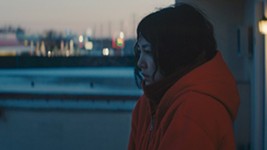A Hundred Years of Shadows
Letters at 3AM
By Michael Ventura, Fri., March 7, 2003
It also happened that in the same year, 1903, a rural California village called Hollywood, already suffering delusions of grandeur, incorporated itself as a city. Ten years later, headquartered in a barn on what is now Hollywood and Vine, Cecil B. DeMille directed the eight-reel feature "The Squaw Man," a huge hit. Almost instantly the word "Hollywood" came to mean, well, whatever anyone wanted it to mean -- a many-valanced word soon incorporated into the languages of all the world, for it had no equivalent in any other tongue. How could there be an equivalent, since the word described not only a phenomenon but a state of mind that had never before existed?
"The Great Train Robbery" demonstrated that there was a huge market for motion pictures by creating that market. Within mere weeks of its release, myriad little film companies popped up (mostly in New York City and New Jersey) to supply the demand, each turning out a one- or two-reel film every week. In 1909-1911 one director, D.W. Griffith, turned out at least 150 of them! So we've no right to complain about the manic, chaotic energies that spurt from today's special-effects blockbusters. The medium was manic from the start. That's what Leo Tolstoy liked about it.
Not long before his death in 1910, the writer of War and Peace and Anna Karenina saw his first film. He was about 80 years old, a relic of another era, but he got the movies. He told a journalist: "You will see that this little clicking contraption with the revolving handle [the motion-picture camera of that day] will make a revolution in our life -- in the life of writers. It is a direct attack on the old methods of literary art. We shall have to adapt ourselves to the shadowy screen and the cold machine. A new form of writing will be necessary. I have thought of that and I can feel what is coming. But I rather like it. This swift change of scene, this blending of emotion and experience -- it is much better than the heavy, long-drawn-out kind of writing to which we are accustomed. It is closer to life. In life, too, changes and transitions flash by before our eyes, and emotions of the soul are like a hurricane. The cinema has divined the mystery of motion. And that is greatness." He added wistfully, "I am seriously thinking of writing a play for the screen." (Perhaps fortunately for Tolstoy, he died before he could become a screenwriter.)
Another Russian, Maxim Gorky, saw his first films in 1896: the simple, short, beautifully shot demonstration-movies of the Lumiere brothers, who had perfected the motion picture camera the year before. (The first moving pictures on celluloid were taken on the streets of London by William Friese-Greene in 1889.) Gorky captures how strange, enchanting, and utterly disorienting were the first experiences of people watching a screen:
"Last night I was in the Kingdom of Shadows. If you only knew how strange it is to be there. It is a world without sound, without color. Everything there -- the earth, the trees, the people, the water and air -- is dipped in monotonous grey. Grey rays of the sun across the grey sky, grey eyes in grey faces, and the leaves of the trees are ashen grey. It is not life but its shadow, it is not motion but its soundless specter ... The extraordinary impression it creates is so unique and complex that I doubt my ability to describe it with all its nuances ... [T]here suddenly appears on the screen a large grey picture, A Street of Paris -- shadows of a bad engraving. As you gaze at it, you see carriages, buildings and people in various poses, all frozen into immobility ... You anticipate nothing new in this all too familiar scene, for you have seen pictures of Paris streets more than once. But suddenly a strange flicker passes through the screen and the picture stirs to life. Carriages coming from somewhere in the perspective of the picture are moving straight at you, into the darkness in which you sit; somewhere from afar people appear and loom larger as they come closer to you ... All this moves, teems with life and, upon approaching the edge of the screen, vanishes somewhere beyond it ... It is terrifying to see, but it is the movement of shadows, only of shadows. Curses and ghosts, the evil spirits that have cast entire cities into eternal sleep, come to mind and you feel as though Merlin's vicious trick is being enacted before you."
The second short on that night's program was of a train. Gorky wrote: "It speeds straight at you -- watch out! It seems as though it will plunge into the darkness in which you sit, turning you into a ripped sack full of lacerated flesh ... But this, too, is but a train of shadows. Noiselessly, the locomotive disappears beyond the edge of the screen ... This mute, grey life finally begins to disturb and depress you. It seems as though it carries a warning, fraught with a vague but sinister meaning that makes your heart grow faint. You are forgetting where you are. Strange imaginings invade your mind and your consciousness begins to wane and grow dim."
Gorky was also struck by where this film was being shown: a fancy restaurant that doubled as a brothel, "so full of women, wine, music and vice." He felt that it was quite crazy to show such things in such a place, and at the same time appropriate. He predicted, in the same article, that films would not long show "the bucolic and the idyllic" Lumiere scenes. "I am convinced that these pictures will soon be replaced by others." He predicted that cinema would soon swamp us with sex, violence, and grotesque fantasies, feeding our thirst "for the piquant and extravagant." Only seven years later, "The Great Train Robbery" would begin with a close-up of a cowboy who draws his pistol and shoots straight at the audience -- coldly, deliberately, and without cause. Pure madness.
Edison's first demo film would be "The Kiss" -- just two people kissing, but for the first time audiences gathered to watch something that was still considered bad taste for respectable folk to do in public. Soon after, men were lining up to savor 20-second soft-porn flickers at the nickelodeons.
Gorky and Tolstoy, in their different ways, understood instantly the same thing: The motion picture, the Kingdom of Shadows, would transform consciousness. We would forget where we are, even who we are, and "strange imaginings" would "invade" us. Tolstoy saw cinema as a powerful entity in its own right, so powerful that it would not adapt to us: "We will have to adapt ourselves to the shadowy screen." "Entire cities," Gorky said, would be "cast into eternal sleep." We would become sleepwalkers, dreaming with eyes wide shut. The traditional, practical, and down-to-earth, would almost cease to count. Our appearance, our ambitions, our lovemaking, the very timbre of our voices (regional accents are dying out in America), would be dominated by what was manifested on the screen's Kingdom of Shadows. We would reflexively compare ourselves to ... fantasy. Dream life would become our concrete goal. "The pursuit of happiness" would come to mean: I want to live like a movie. (Which isn't exactly what Jefferson had in mind.)
I think of a haunting sentence Josef von Sternberg said late in his life, years after he directed his last film: "I believe the cinema was here from the beginning of the world."
Something there is, hidden in Nature from the beginning, that wants to transform waking life into dream, even into nightmare. Through the motion picture this Merlinesque force would be given a terrific, irresistible power.
The last shot of "The Great Train Robbery" is the same as the first: The cowboy draws his pistol and shoots us again.
Bang, you're dead. Dead to the world. A shadow. Living the demands of the dream. ![]()










